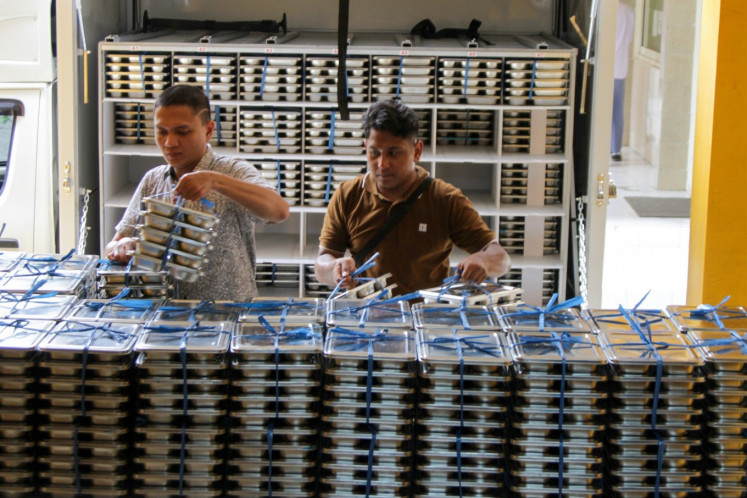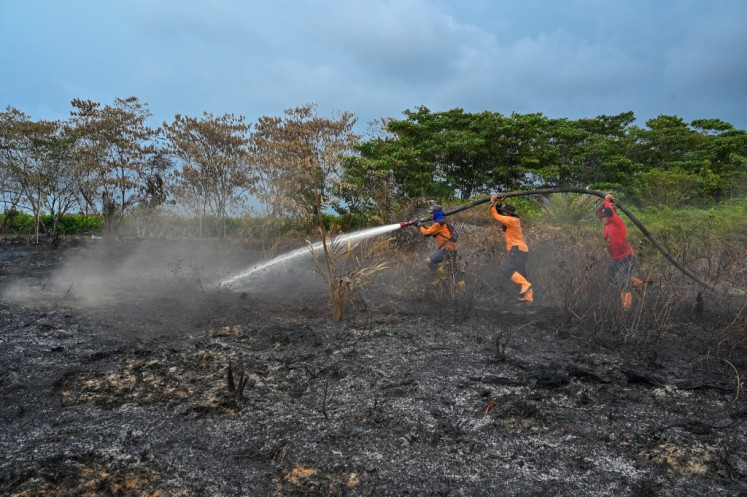German official proposes restricted Syrian asylum status
Migrants signal to staff of the LaGeSo (State Office of Health and Welfare) how many seats they need for further transport with busses after they arrived at the train station in Schoenefeld near Berlin, Oct
Change text size
Gift Premium Articles
to Anyone
 Migrants signal to staff of the LaGeSo (State Office of Health and Welfare) how many seats they need for further transport with busses after they arrived at the train station in Schoenefeld near Berlin, Oct. 30. (AP/Markus Schreiber) (State Office of Health and Welfare) how many seats they need for further transport with busses after they arrived at the train station in Schoenefeld near Berlin, Oct. 30. (AP/Markus Schreiber)
Migrants signal to staff of the LaGeSo (State Office of Health and Welfare) how many seats they need for further transport with busses after they arrived at the train station in Schoenefeld near Berlin, Oct. 30. (AP/Markus Schreiber) (State Office of Health and Welfare) how many seats they need for further transport with busses after they arrived at the train station in Schoenefeld near Berlin, Oct. 30. (AP/Markus Schreiber)
M
span class="caption">Migrants signal to staff of the LaGeSo (State Office of Health and Welfare) how many seats they need for further transport with busses after they arrived at the train station in Schoenefeld near Berlin, Oct. 30. (AP/Markus Schreiber)
Germany's interior minister said Friday he wants to give many Syrians arriving in the country a form of protection that falls short of full asylum and wouldn't allow them to bring relatives to Germany for two years.
The proposal by Interior Minister Thomas de Maiziere appeared to catch at least part of Chancellor Angela Merkel's governing coalition by surprise and created new confusion over the government's crisis response.
De Maiziere's ministry said the idea was that Syrians who don't present authorities with evidence of individual persecution but are fleeing the civil war in general should be given "subsidiary protection," something that falls short of full asylum status but is granted to people who face serious risks in their homeland. While people with full asylum status get a three-year residence permit, those with "subsidiary protection" get a one-year permit that can be extended repeatedly.
On Thursday, Merkel and her coalition partners agreed that people with "subsidiary protection" shouldn't be able to bring relatives to Germany for two years. They didn't mention Syrians, and that agreement came alongside a deal to set up new centers to process more quickly people who have little hope of asylum ' such as those from Balkan countries.
De Maiziere told Deutschlandfunk radio Friday that other countries in similar situations grant residence "for a limited time, and we will do this in the future with the Syrians as well, in that we tell them: you will get protection, but the so-called 'subsidiary protection.'"
It wasn't clear to what extent the conservative de Maiziere had discussed the idea with anyone else in Merkel's coalition. Ralf Stegner, a deputy leader of the center-left Social Democrats, said his response was a "clear no."
Hours later, de Maiziere appeared to walk back from his proposal.
"There is no change in the approval practice for Syrian refugees," he said, adding that a change had been planned at the beginning of the week.
However, he said, in light of the decision Thursday on limiting some people's ability to bring relatives to Germany, "there is need for discussion in the coalition, and so things will now stay as they are until there is a new decision."
The government faces strong pressure to limit the influx of refugees into the country, and Thursday's decision to set up new processing centers itself followed prolonged squabbling in the coalition.
Germany has seen more arrivals than any other European Union country. Authorities registered 181,000 asylum-seekers entering Germany in October, bringing the figure for 2015 so far to 758,000. Syrians are the largest single group arriving.
Ulla Jelpke, a lawmaker with the opposition Left Party, condemned de Maiziere's idea.
"It will lead first and foremost to women and children who are waiting to be able to come here now setting off on the dangerous refugee routes, and that often means their death," she told ARD television. (kes)









